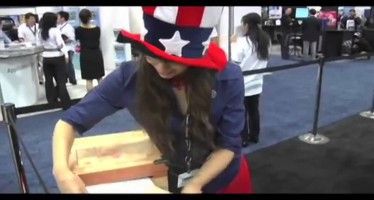CARB's punitive approach

MAY 7, 2010
By ANTHONY PIGNATARO
Failing to file a report. That’s it. That’s all Nor-Cal Produce in West Sacramento did. And in late March it cost the small, family-run fruit and vegetable wholesaler $32,550.
“The California Air Resources Board [CARB] last month came to terms with a West Sacramento, Calif. produce company for $32,550 for failing to submit its TRU facility report,” stated a March 30, 2010 CARB press release which called the case a matter of “diesel emissions violations.” “ARB investigators found that NorCal Produce did not submit the required facility report by the 2006 deadline, as required by the transport refrigeration unit [TRU] air toxic control measure [ATCM].”
Of course, the company was actually facing $43,400 in penalties (or more) but qualified for a 25 percent discount because of, as CARB spokesman Dimitri Stanich put it, “cooperative actions on the part of the business.”
“The NorCal facility employees helped ARB on the development of the regulation and even allowed ARB to use their facility as a training area,” Stanich wrote in a May 4 e-mail. “As a result, ARB was in regular contact with them and was ready to help with any questions they might have had… The company understood the issues related to timing and compliance, as evidenced by the fact [that] it self-reported.”
Though a small case when compared to other recent CARB enforcement decisions, the Nor-Cal Produce settlement caught the attention of Air Resources Board critics in the state Senate. “Exposing gross polluters is one thing, but shaming a West Sacramento company for failing to file a report (as they recently did) is beneath the dignity of a state agency,” stated an April 21 e-mail from the California State Senate Republican Caucus titled “Briefing Report: The Legislature’s Large CARB Footprint.”
According to Stanich, Nor-Cal Produce was 434 days late in filing a “Facility Report,” – with penalties set at $200 per day of non-compliance, that would added up to $86,800 in total fines had someone from CARB eventually found them out. But since Nor-Cal self-reported the non-compliance, the penalty was halved to $100 per day, which brought the total to $43,400. Nor-Cal’s other cooperative acts further discounted the penalties to $32,550.
In his May 4 e-mail, Stanich added that CARB was “unaware of the reasons why the facility did not report as required.”
The reason, says Todd Achando, Nor-Cal Produce’s Chief Financial Officer, was simply that the company had no idea the TRU facility reporting requirement existed. “We had no knowledge of the law,” Achando said. “My operations manager happened to see it mentioned in a trade magazine about a year and a half after the deadline passed.”
While Achando insisted that CARB personnel were “very helpful” and that relations between the agency and his company were “very amicable,” he also said CARB never notified anyone at his company that they were out of compliance. The penalty clock just kept ticking until a random magazine article got the company moving.
The rule that Nor-Cal Produce violated actually dates back to Feb. 26, 2004. That’s when CARB approved the Airborne Toxic Control Measure for in-Use Diesel-Fueled Transport Refrigeration Units and TRU Gen Sets, and Facilities Where TRUs Operate, known by friendly acronym TRU ATCM. The point of all that bureaucratese is simply that CARB had taken it upon itself to identify, track, regulate, investigate, scrutinize and examine any and all diesel-powered refrigerators attached to semi-trailers, shipping containers, vans and rail cars.
“Although TRU engines are relatively small, ranging from 9 to 36 horsepower, significant numbers of these engines congregate at distribution centers, truck stops, and other facilities, resulting in the potential for health risks to those that live and work nearby,” stated CARB Advisory No. 346, Facility Reports Due for Facilities Where Transport Refrigeration Units Operate. “Since diesel particulate matter has been identified as a toxic air contaminant, the ARB adopted an [ATCM] for TRUs and TRU generator sets on February 26, 2004.”
Since there many thousands of these refrigeration units rolling on California roads and highways – not all of which are owned by companies based here – CARB agreed to phase in regulation over 15 years. One of the earliest steps in that process was the decree that any and all companies or agencies that own, operate or otherwise contract for TRUs, have “20 or more loading dock spaces serving refrigerated storage areas” and load or unload perishable goods would have to file a one-time “Facility Report” with CARB by Jan. 31, 2006. That report would detail the company’s TRU use and provide a foundation for future reports.
From the get go, CARB minced no words as to the importance of this report.
“Failure to report or reporting of false information is a violation of state law and could result in civil penalties,” states a 22-page “Frequently Asked Questions” guide on TRU ATCM compliance published by CARB (that the agency had to print 22 pages of “frequently asked questions” on the new regulations might have tipped off someone that compliance might at least be difficult, but that’s another issue). “Penalties are not excused for negligent recordkeeping and reporting, or not knowing about this regulation.”
There’s a lot of hubris in those sentences, but then again, the hubris at CARB sometimes gets pretty thick.
“California is leading the way on air quality,” CARB Enforcement Chief James Ryden says in the March 30 NorCal Produce press release. “By monitoring diesel emissions the state can set an example for the nation.”
Ryden’s correct about California leading the nation, but not in the way he’s intending. On April 28, the American Lung Association released its annual ranking of the nation’s “Most Polluted Cities.” Where ozone is concerned, 12 of the worst 25 cities are in California, including all of the top five and eight of the top 10. In year-round particle pollution, five of the worst 10 cities are in California; the state also holds seven of the top 10 cities in terms of short-term particle pollution.
In the meantime, Stanich says that CARB is continuing to investigate – and penalize – companies that didn’t file TRU Facility Reports. “There were at least a dozen other facilities that were found in violation and settled,” he e-mailed, “and two more pending.”
For more in CalWatchdog’s ongoing look at the California Air Resources Board, click here to read why one sand car dealer called CARB a “mob leader,” here for the story on how they penalized two motorcycle dealers for bad DMV actions and here for a look at what its like to attend a CARB hearing.
Related Articles
California experiments with open-source voting
After spending tens of millions of dollars in recent years on ineffective voting systems, California election officials are planning
CA’s history of direct democracy sometimes brings out ‘crackpots’
This week, lawmakers once again loudly proclaimed their outrage at a proposed ballot initiative that would allow voters to decide
Another harsh audit targets state Dept. of Public Health
State Auditor Elaine Howle on Tuesday issued another scathing audit of the California Department of Public Health, declaring that it




